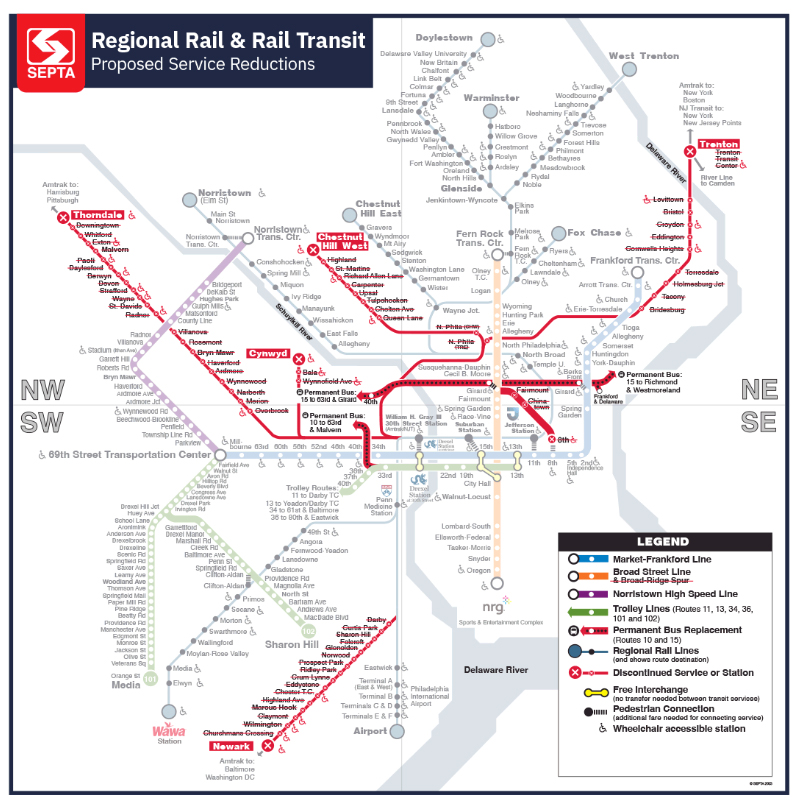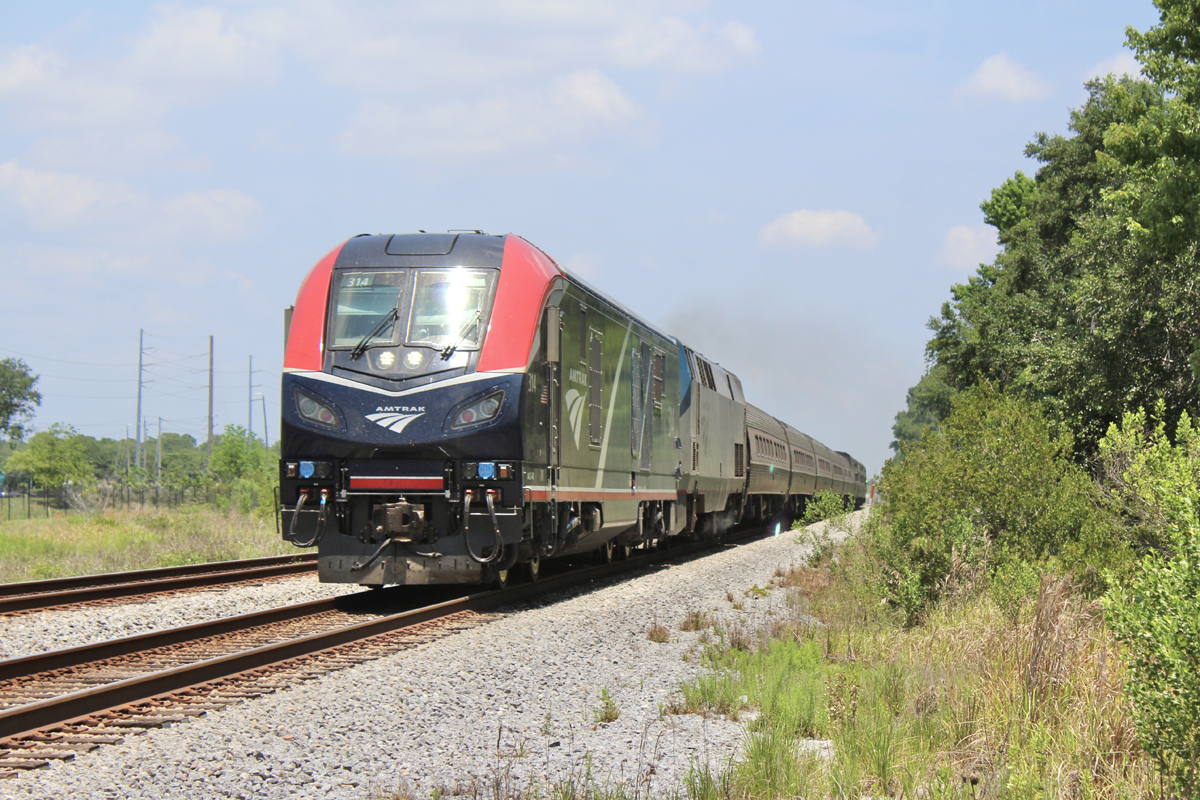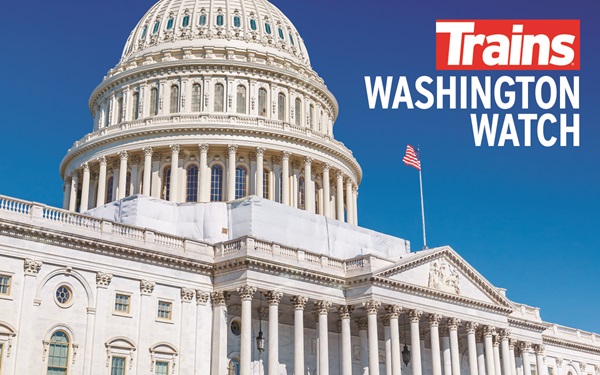
PHILADELPHIA — The Southeastern Pennsylvania Transportation Authority board has approved a fiscal 2026 budget including a 45% cut in service and a 21.5% fare increase to address a $213 million deficit.
“This is a vote none of us wanted to take,” SEPTA Board Chair Kenneth E. Lawrence Jr. said in a press release following the vote on Thursday, June 26. “We have worked hard as an Authority to prevent this day from coming because we understand the impact it will have on our customers and the communities we serve. To be clear, this does not have to happen – if state lawmakers can reach an agreement to deliver sufficient, new funding for public transit.”
Under the approved budget, service cuts will begin Aug. 24, with elimination of 32 bus routes and reductions in frequencies for all rail services, including the end of special-event service such as that offered for sporting events. On Sept. 1, the base fare for bus and Metro rail services will rise to $2.90, equaling the fare of New York’s Metropolitan Transportation Authority for the highest in the country. The agency will also freeze all hiring.
Another round of cuts on Jan. 1, 2026, will see service end on five Regional Rail routes, end of service after 9 p.m. on remaining rail lines, and more bus-route eliminations.
“This budget will effectively dismantle SEPTA — leaving the City and region without the frequent, reliable transit service that has been an engine of economic growth, mobility, and opportunity,” said SEPTA General Manager Scott A. Sauer. “Once this dismantlement begins, it will be almost impossible to reverse, and the economic and social impacts will be immediate and long-lasting for all Pennsylvanians – whether they ride SEPTA or not.”
The funding shortfall has developed through a series of factors including the end of federal COVID relief funding, inflation, and additional costs the agency says have developed with “emerging challenges — particularly crime, disorder, and the vulnerable population.”
SEPTA had outlined the potential cuts in April, while urging the state legislature to provide funding to address the budget shortfall [see “SEPTA prepares …,” Trains News Wire, April 10, 2025]. The agency avoided cuts and a fare increase last year only because Gov. Josh Shapiro transferred $153 million in federal highway funds to cover a deficit, but that was a one-time move [see “Pennsylvania governor’s move averts …,” News Wire, Nov. 23, 2024]. Republicans in the Senate, which has blocked bills to increase transit funding each of the last three years, criticized that action because it did not address their pursuit of increased funding for road infrastructure or for cuts by SEPTA because of reduced ridership.
This year, Shapiro has proposed $292 million for additional transit funding across the state, which would prevent the major cuts at SEPTA, as well as those faced by Pittsburgh Regional Transit [see “Pittsburgh transit agency outlines plans …,” News Wire, March 22, 2025]. The state House passed that proposal earlier this month, which would provide the funds by increasing share of state sales tax that goes to transportation from 4.4% to 6.15%. That bill also calls for an additional $500 million for roads and bridges [see “Pennsylvania House passes bill …,” News Wire, June 18, 2025]. The Senate has yet to act on that legislation.













I never knew about Detroit’s Portuguese streetcar until this thread. It managed to roll along for almost 17 years.
https://en.wikipedia.org/wiki/Detroit_Downtown_Trolley
Thanks for the info. That’s about 15 more years than I remember. I will read the link.
For those who rely on the reduced public transit profiles, would a study involving contracts with ride share firms be somewhat of a solution?
It’s very obvious from looking at the map that SEPTA wants a divorce from Amtrak. The “Reading” side of the system remains in service, but the “Pennsy” side mostly gets closed down except for the portions that are segregated from Amtrak.
The trouble is the drivers don’t pay the tab of the enormous $$$ shortages of hwys they are siphoned Federal Treasury thus adding to the deficit. But they feel that’s legitimate because they use it & anything they don’t use is considered wasteful. This narcissistic mindset has become the norm for Americans.
We have subsidized public transportation for as long as I remember, Galen, so plz. spare us your moralism about our norms. I live in an area where transit use is very low (and falling), but I can’t recall hearing from anyone (citizens or politicians, either group) that the system should be shut down.
Problem is, Galen, in all systems nationwide, ridership is at best stagnant, in some systems way down. Pension costs have skyrocketed, capital expenditures are no longer affordable, union wages increase.
People who have been okay with tax subsidy of systems they don’t use aren’t always going to have the same generosity.
Unlimited money for the DoD and foreign military bases and adventures. Locally, $2.5B to rebuild sections of I81 through Syracuse; just a few major interchanges. $20B in public money to Micron for a chip fab (ignoring multiple manufacturers employing thousands going belly-up due to foreign trade). As Warren Buffet said, his secretary pays a higher tax rate than he does!
It is simply a question of priorities. Public transit works if properly funded. The US has upside down priorities, money for foreign adventures and billionaires. The 99% can pick up the tab and buy a car.
Can someone explain precisely how “… crime, disorder, and vulnerable population” contributed to this decisions?
Next to fall (next of many). Milwaukee County Transit System, which is a bus line. An article in today’s jsonline.com (Milwaukee Jornal Sentinel) states that the county auditor is “surprised” by MCTS deficit.
No one else is surprised.
In the 36 years I have lived in the Metro area, I have watched Milwaukee County government go from its former place as America’s pride (parks, sheriff, etc.), to just another urban fiscal basket case. I feel for the people who need the buses, as the county can no longer run buses with two or three passengers (or sometimes none at all). The county has already dropped some of the “Freeway Fliers”, rush hour buses which we well loaded with suburbanites. Meanwhile, the state DOT has closed two freeway park-rides where the buses formerly loaded. because they were taken over by vagrants living in trailers or whatever else.
Vagrants taking over public facilities is part of the plan, isn’t it?
You’re right Charles. Transit funding is nothing but a black hole of pouring money down the cesspit. Less people working downtown, more people working from home, more companies moving to the suburbs to escape the high taxes and increased crime that the Democrat city administrators don’t seem to be able do anything about. Yet these transit companies keep expanding their networks with no reasonable way to support them. Cutting service and discontinuing lightly patronized lines is the only way to go along with increased fares. Some cities are starting to get smart by getting rid of the useless transit they don’t need like the DC streetcar and the Minneapolis commuter train. More is needed.
A moratorium on multi-million dollar consultant contracts for service extensions that will never happen. Which is pennies compared to the deficits we are facing.
“Some cities are starting to get smart by getting rid of the useless transit they don’t need like the DC streetcar […].”
Mr. McGuire, your post is the first I’ve read/heard of that. *That* didn’t last long.
Here’s some mb chat on the DC streetcar’s demise…
https://www.trainorders.com/discussion/read.php?4,6029039
Detroit’s Washington Boulevard trolley was dedicated in the late 1970’s and lasted a few years. By 1984, the streetcar was already sinking into the “memory hole”. Now in the year 2025, of the population of Detroit (700k) you won’t find a dozen people who could tell you it ever happened.
This was a two-foot gauge single-truck operation, two ancient trolleys bought from Oporto, Portugal.
At the time, the city’s Public Lighting Department still employed one or two guys who had powered Detroit’s real street cars (discontinued in 1956). They strung wires for the beast. This was the world’s roughest-riding trolley. The tiny handful of riders would have needed barf bags.
The cost and revenue were buried into one of the city bus system’s three terminals, so no one knew either the ridership or the operating deficit.
One sunny day, I waited for the trolley at Woodward and Jefferson. When the trolley set off west on Jefferson, I paced it on foot. At a walk, not a run. West on Jefferson, then north on Washington Boulevard, I kept up. And wouldn’t you know it, at the last block on Washington Boulevard, the trolley made the traffic signal but I didn’t. The thing actually beat me. To this day, I’m still sore about it.
So what is my point? I remember the dedication ceremony. Two former Tuskegee Airmen (R.I.P. both) led the party, Detroit Mayor Coleman A. Young and U. S. SecDOT, I’m not 100% sure of his name but I think it was William T. Coleman. Point is, how could President Gerald Ford’s USDOT be so fooled to call this useless amusement park ride “transportation”.
I’m 100% for subsidized rail transportation. But not for every idiotic proposal.
What’s their rationale for shutting down their busiest lines? Can only be political. Pretty shameless act by Septa. They could do better than this.
If you mean the Newark and Trenton lines, those operate over the NEC. Cutting those lines cuts a lot of ridership, but also means they don’t have to pay Amtrak to host their trains.
DANIEL – Amtrak will have track space (and electrical capacity) to add trains if added trains will run at a positive profit margin.
I cannot cite the legislation one way or the other. Amtrak does have schedules amenable to daily commuters. If profitable Amtrak can do the same in NEC.
Coming to a transit agency near you. Philadelphia is the leading edge of a brutal tidal wave that will engulf public transportation across America.
No transportation provider has ever cut its way to prosperity. The SEPTA official is correct: once cuts are enacted, they cannot and will not be reversed. The only result of service cuts will be more service cuts. What SEPTA is proposing will be this: less revenue to support more pensions.
Do I have an answer? Well, does anyone else? I do have two suggestions. Declaring bankruptcy is the only way to modify pension obligations. It’s been done – the City of Detroit BK of a decade ago.
Another partial answer will be for the state and federal governments to take a firm stand against fare jumping — that a transit agency that tolerates fare jumping will be shut down. (Are you listening, New Yorkers? Far from cracking down on fare jumping, you New Yorkers voted this week for no fare revenue at all.)
Of course my two suggestions are only partial answers to what seems to be an unsolvable doom loop.
Well there is one thing they could do. Get the unions to cut their wages. In any other business that’s what happens when revenues don’t cover expenses. Everyone needs to share in the pain this time. Taxpayers. Management. Suppliers. Riders. And yes union workers.
Unfortunately, Charles may be right about both SEPTA (and Pittsburgh) needing to declare bankruptcy. However, if the metropolitan communities that these transit agencies operate in will finely bite the political bullet and agree on new dedicated local taxes to make up much of their deficits, that would go a long way towards limiting the cuts that have to be made. For sure, PA can’t be annually giving what Gov. Shapiro proposes. Especially, since PA roads ,bridges, etc. are needing a lot of repair throughout the state.